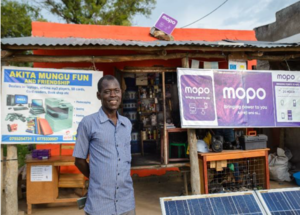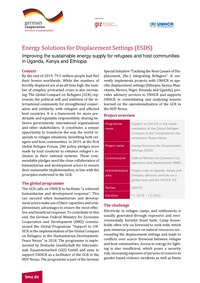Energy Solutions for Displacement Settings (ESDS) - Factsheet
Context
At mid-2023, 110 million people worldwide were forcibly displaced while the number of complex, protracted crises is increasing. The Global Compact on Refugees (GCR) represents the political will and ambition of the international community for strengthened cooperation and solidarity with refugees and affected host countries. It is a framework for more predictable and equitable responsibility-sharing between governments, international organisations and other stakeholders. It constitutes a unique opportunity to transform the way the world responds to refugee situations. In 2019, at the first Global Refugee Forum, 280 policy pledges were made by host countries to enhance refugee’s inclusion in their national systems. These commendable pledges need the close collaboration of humanitarian and development actors to ensure their sustainable implementation, in line with the principles enshrined in the GCR.The Global Programme
The GCR calls on UNHCR to facilitate “a coherent humanitarian and development response”. This can succeed when humanitarian and development actors make use of their capacities and complementary advantages to ensure the most effective and beneficial response. To contribute to this end, the German Federal Ministry for Economic Cooperation and Development (BMZ) commissioned the Global Programme “Support to UNHCR in the implementation of the Global Compact on Refugees in the Humanitarian-Development-Peace Nexus” in 2018. The programme is implemented by Deutsche Gesellschaft für Internationale Zusammenarbeit (GIZ) GmbH and aims to support UNHCR as a facilitator of the GCR in the HDP Nexus. The programme is part of the German Special Initiative “Tackling the Root Causes of Displacement, (Re-) integrating Refugees”. It currently implements projects with UNHCR in specific displacement settings (Ethiopia, Kenya, Mauritania, Mexico, Niger, Rwanda and Uganda), provides advisory services to UNHCR and supports UNHCR in consolidating and analysing lessons learned on the operationalization of the GCR in the HDP Nexus.
| Programme name | Support to UNHCR in the implementation of the Global Compact on Refugees in the Humanitarian-Development-Peace Nexus |
| Project name | Energy Solutions for Displacement Settings (ESDS) |
| Commissioner | Federal Ministry for Economic Co-operation and Development (BMZ) |
| Implementation area | Project sites in Uganda, Kenya and Ethiopia; advisory services on a global level and for UNHCR HQ |
| Partner | UNHCR |
| Duration | 11/2018 – 12/2024 |
The Challenge
Electricity in refugee camps and settlements is usually generated through expensive and environmentally harmful fossil fuels. Camp households often rely on firewood to cook with, which puts immense pressure on natural resources and leads to conflicts over scarce firewood between refugee and host communities. Access to energy for lighting is also insufficient, which poses a security risk and limits households’ ability to pursue activities in the evenings. Given the fact that refugee camps exist for decades, more environmentally friendly and cost-effective solutions should be harnessed. Building up local markets for safe, sustainable, reliable, and affordable cooking and lighting solutions has immense potential to strengthen local economies and create income-generating opportunities.
Project Objectives
With this project, Germany contributes to UNHCR’s Clean Energy Challenge with the aim to advise UNHCR technically and strategically on the implementation of its energy strategy 2019-2025. The strategy aims to enable refugees, host communities and people of concern to meet their energy needs in a safe and sustainable way. The project is piloting innovative energy approaches in Uganda, Kenya and Ethiopia and disseminates lessons learnt from measures implemented in these three pilot countries. GIZ leverages its technical expertise, its close ties with local energy ministries and connections with other GIZ energy programmes.
As the Clean Energy Challenge Baseline Data Visualization shows, the given conditions regarding access to sustainable energy for refugees and host communities differ in the three project-countries, translating itself into context-specific activities whose scope vary for the countries. The three intervention areas constitute however the overall and common framework.
Project activities
Improving the policy framework: SUN ESDS supports the development of strategic energy plans in Uganda, Kenya and Ethiopia at the national and regional levels. The focus is on creating framework conditions that encourage the self-reliance of the communities' energy supply by facilitating local market structures. Its main approach is to enable national and regional government stakeholders and UNHCR to share knowledge, lessons learnt and examples of good practice.
Greening UNHCR infrastructure: The project supports UNHCR in its transition to renewable energy for its infrastructure. Its focus is on reducing UNHCR’s premises diesel consumption by developing solarisation solutions and improving energy efficiency. Energy-as-a-service models are being developed, in which private companies offer various energy-related services.
Increasing market-based access to energy: The project improves households’ and social institutions’ energy access via market-based and sustainable solutions, such as biomass fuels used with improved cookstoves. Pilot projects are used to overcome market failures and the collection, disposal and reduction of e-waste is promoted.
Examples of Project Activities
ESDS explores the potential to improve livelihoods through the participatory design of energy solutions and seeks to promote productive use of energy and job creation in energy value chains among refugees and host communities.
The project analyses the regulatory conditions for entering service contracts with private renewable energy suppliers in displacement contexts in Ethiopia, Kenya and Uganda. The results are fed directly into UNHCR procurement processes.
ESDS assesses biomass fuels, considering their local value chains, with the goal of minimizing the exploitation of natural forest and other resources around refugee camps. In addition, business case scenarios and financing schemes for profitable biomass cooking fuel production are being developed.
The factsheet can be downloaded here:
Partners
GIZ's Energy Solutions for Displacement Settings (ESDS) project cooperate with UNHCR to enhance the access to sustainable energy in displacement contexts, and the Energypedia page has been created to share learnings across various practitioners to spur the development of clean energy solutions.






















